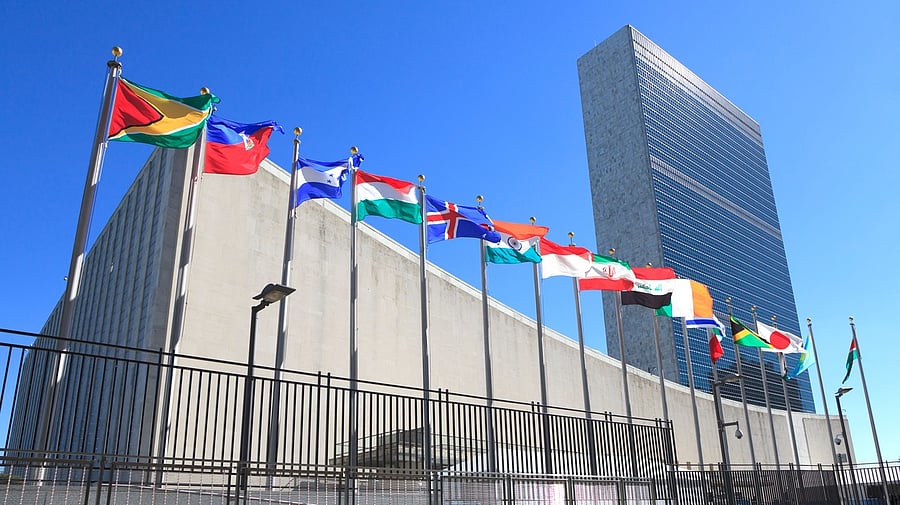
Image showing the UN headquarters in New York. For representational purposes.
Credit: iStock Photo
New Delhi: India has scored a diplomatic victory as an emergency meeting of the United Nations Security Council has seen several of its members raising tough questions on the role of the terrorist organisations based in Pakistan in plotting and perpetrating the April 22 carnage at Baisaran in Pahalgam in Jammu and Kashmir.
New Delhi’s outreach to the permanent and non-permanent members of the UN Security Council over the past few days paid dividends as the council ended its emergency meeting in New York without issuing any statement in favour of Islamabad.
The envoys of several UNSC member nations asked tough questions to Islamabad’s representatives on the role of the organisations based in areas under the control of Pakistan across the Line of Control in carrying out the attacks in India, including the latest carnage, a source in New Delhi said.
Islamabad wanted to use the meeting of the Security Council to distract the attention of the international community from the role of the entities based in Pakistan in the latest terrorist attack in India, by focusing on the issue of de-escalation and "the need to avoid" a military confrontation.
New Delhi conveyed to the UNSC members ahead of the meeting that the international community should no longer turn a blind eye to Pakistan’s continuous export of terrorism, not only to India, but also to other countries in the region and beyond, the source told DH.
Prime Minister Narendra Modi, on April 29, gave the armed forces of India “operational freedom” to respond to the attack, which was carried out by the terrorists owing allegiance to The Resistance Force, an offshoot of Lashkar-e-Tayyiba based in Pakistan.
Islamabad, however, succeeded in getting a statement issued by the Organisation of Islamic Cooperation (OIC), noting that the unresolved dispute between India and Pakistan over J&K remained the core issue affecting peace and security in South Asia.
“The people of Jammu and Kashmir continue to be denied their inalienable right to self-determination as enshrined in the relevant United Nations Security Council (UNSC) resolutions,” the 57-nation bloc stated. It reiterated its principled position against terrorism, but rejected “all attempts to associate any country, race, religion, culture or nationality” with the menace.
India dismissed the OIC statement issued “at the behest of Pakistan” as “absurd”. It noted that the OIC had refused to recognise the facts of the April 22 terrorist attack near Pahalgam in J&K and its “cross-border linkages”. “This is yet another attempt by Pakistan, a country that has long engaged in cross-border terrorism, to manipulate and misguide the OIC Group to issue a self-serving statement,” Randhir Jaiswal, the spokesperson of the Ministry of External Affairs, said in New Delhi. “We reject the OIC’s interference in matters that are internal to India.”
The meeting of the Security Council in New York was convened by Ambassador Evangelos Sekeris, the Permanent Representative of Greece to the United Nations and the current UNSC President, at the request of Pakistan.
Sekeris later told journalists that the UNSC had a "productive” and “helpful” meeting.
Unlike India, Greece and Pakistan are currently non-permanent members of the UNSC. China is one of the five permanent members of the council, with others being France, Russia, the US and the UK.
The majority of the members of the Security Council stressed that Islamabad should sort out its differences with New Delhi bilaterally, although China extended support to its all-weather ally Pakistan, reiterating its position that the two South Asian nations must resolve the dispute over Kashmir “peacefully and properly through the UN Charter, relevant Security Council resolutions and bilateral agreements”.
Beijing, however, joined the other members of the Security Council in condemning the killing of 26 people by the terrorists in J&K on April 22.
There was a call for dialogue and peaceful resolution of the conflict, Mohamed Khaled Khiari, UN Assistant Secretary-General for the Middle East, Asia and the Pacific, told journalists after the meeting of the Security Council at the UN headquarters in New York. Khiari briefed the Security Council about the escalation of tension between India and Pakistan in the wake of the carnage in J&K. He said that the council considered the situation to be volatile.
